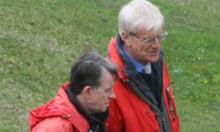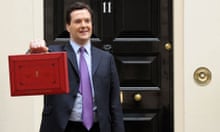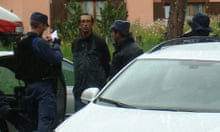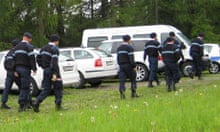On his way back from Bilderberg, Alexei Mordashov, the
Russian steel magnate, swept through the airport checkpoint in a window-tinted people carrier. Here he is, about to board his private jet at St Moritz airport:

Nice bag. You don't get to be worth $18.5 billion without developing a taste for classy accessories. The only classier bit of luggage we saw all conference was this stylish holdall, carried by... well, see if you can guess from the legs. And the coat of arms on the side of the jet...

That's right, delegate spotters, it's Queen Beatrix of the Netherlands! A shame we're only seeing her knees, and are denied our annual peek at her glorious Molly Sugden bouff. Still, we got to enjoy the two-tone swirls of Fu Ying (China's Vice-Minister of Foreign Affairs and current Chinese Ambassador to the UK) on Lord Mandelson's nature walk.
Here's a reminder: it's Fu Ying strolling with Neelie Kroes, European Commissioner for Digital Agenda and a Vice President of the European Commission.

The gong for worst hair of the conference belongs to tech investor Peter Thiel, co-founder of Paypal. I guess when you're only worth a couple of billion, and only own about 3% of Facebook, you have to make do with Tesco Value hair dye.

Maybe he was thinking: I'm in Switzerland, I'll go with their national colour. I'm tempted to approach him for seed capital for my peer-to-peer nanotech tinting solution.
The post-Bilderberg Thiel seemed a little grumpy at the airport. Maybe he was hungover after David Rockefeller's birthday disco. Or maybe the discussion on: 'Social Networks: Connectivity and Security Issues' hadn't gone his way.
Thiel is a good Bilderberger, in that he's an avowed fan of a global single-market, single-currency future. He says "everything that counts as political represents a counterforce to globalization" Perhaps he needled the politicians present with his view that: "as we continue to see the globalization of the world economy, we will come to see government more and more as a reactionary force, as a force that is standing in the way of progress. And we will have to make a very drastic choice."
Thiel's single-market libertarianism fits snugly with Bilderberg's desire to see national sovereignty melt away and supranational bodies (and corporations) take its place. Thiel is forever celebrating the individual, and the individual's choices. But in a world without government, without politics, there's nothing much standing between his newly empowered individual and the unimpeded transnational corporation.
You might think that the protesters outside Bilderberg are largely anti-government. In fact you'll find, on the whole, that they're anti-anti-government, insofar as they know that representation within a functioning and sovereign democratic system is their best defence within a free-for-all global economy.
They know that attending Bilderberg you've got the Chairman of Novartis, Daniel Vasella. You've got the Chairman of Coco-Cola HBC, George A. David. You've got Marcus Agius, the Chairman of Barclays PLC. The activists know that the bottom line of these fine fellows is not the interests of the general public.
And why would it be? They're businessmen. The public didn't vote Amazon's Jeff Bezos into office. And they don't expect representation from Peter Brabeck-Letmathe, the Chairman of Nestlé - seen here on his way to his private jet:

But maybe they voted for George Osborne.
It's such a comfort to know that our Chancellor has spent the last four days at the Bilderberg summit fighting for the interests of the British people. Delegates have been debating, amongst other things, "Budgetary Discipline" - which sounds like we've got rocky times ahead. But you know what? It'll be fine. Osborne's got our back.
If you'd like to know what the Chancellor been discussing at Bilderberg, and to hear what he's achieved, then simply watch one of the BBC reports from St Moritz. Or catch up with the analysis on CNN. Or read the commentary in the Independent. Or find out what the Daily Telegraph's political editor made of his trip to the conference. Or listen to Radio 4.
Or watch Sky News. Or read the Express. Or the Washington Post. Or catch up with the gossip from the venue on the Huffington Post.
Or open the Guardian.
Oh my god, I just had a crazy thought. Imagine if none of the British press had bothered covering this major international summit! Imagine if the BBC hadn't sent a news crew! Imagine if George Osborne wasn't being interviewed by heavyweight political journalists about his official trip as Chancellor to perhaps the world's most important annual policy forum! Ha ha ha ha -- ah, sorry, just amusing myself there.
Where was I?
Oh yes - at the airport. With Alexei Mordashov.
I know that you're sick to death of the media analysis of this year's conference, but I'm going to take a wild, amateurish swing at explaining why Mordashov is here in St Moritz this year.
A few years ago, the oligarch declared: "we would like to build the biggest steel company in the world". So far, he's managed to turn Serverstal into the biggest steel company in Russia. But only the 9th biggest worldwide. That's the sort of life-disappointment that can keep you up at night.
Mordashov is the only (declared) Russian delegate at Bilderberg 2011. So why was he invited? Presumably he's not go much to to say on the subject of "Demographic Challenges" or "Social Networks". I think the topic "Conflict Areas" might be getting closer to his usefulness.
Here's what I reckon. Back in 2003, Mordashov was made a representative of Vladamir Putin in the 2004 election. In 2006, Mordashov told the FT that, "as a good corporate citizen", he consults his government when making big decisions.
Top of the "Conflict Areas" discussed at Bilderberg was presumably Libya. And we know that Vladamir Putin recently derided UN Security Council Resolution 73 as being "defective and flawed" because it "allows everyone to do anything, take any action against a sovereign state." So, is Mordashov at Bilderberg because Putin said the action in Libya "reminds me of a medieval call to a crusade?" Is it because Putin asked, of the NATO targetting of Gadaffi: "Who took on the right to execute this man, no matter who he is?"
Is Mordashov a steel-timbered bridge to Moscow?
Maybe someone better qualified than me can answer that.





Comments (…)
Sign in or create your Guardian account to join the discussion